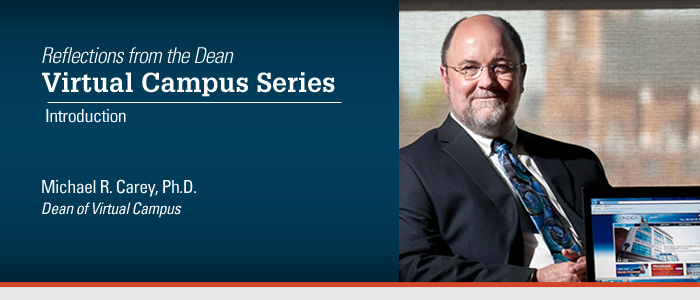As we move into 2015, we welcome Dr. Michael Carey, Dean of the Virtual Campus, as a guest contributor to the blog. He will write a monthly series entitled Reflections from the Dean. Here he will share his thoughts on a variety of topics including the history and purpose of the Virtual Campus, Ignatian Pedagogy, and learning through metaphor.
Dean Carey has been an educator for forty years, with experience as a teacher and administrator at the primary, secondary, and higher education levels. He was the first faculty member hired to teach in the Organizational Leadership program when it began in 1987. His areas of specialization include Transforming Leadership, Servant-Leadership, and Ignatian Pedagogy. In 2004, Dean Carey started the first online graduate degree program at Gonzaga.
Virtual Campus Series: Introduction
I know what you are thinking: what exactly is a “virtual” campus? Gonzaga University created its Virtual Campus in 2012 primarily to support the online delivery of graduate programs. Having a Virtual Campus means that a student is a member of the Gonzaga learning community, whether he or she lives in a house in Spokane or a flat in the Bronx. It means that a student’s learning experience will happen through a variety of media: sometimes face-to-face, sometimes online, and sometimes through a combination of both; and it means that interaction with faculty and other students may happen on Gonzaga’s Spokane campus, or someplace in Europe or Latin America, or maybe without leaving home.
Gonzaga’s use of online and other technologies serves to deliver an educational experience to learners wherever they are. From that perspective, trying to compare face-to-face classroom experiences to online experiences to hybrid experiences is not helpful and may even be a bit problematic. For example, in the old paradigm, the approach was to take the face-to-face classroom experience as the norm and replicate it off-campus, which meant that learning at a distance always paled in comparison because it was impossible to perfectly replicate the campus experience. The new paradigm identifies the learning experience as normative, and views campus face-to-face courses and distance courses using online technology as different modalities used to deliver a quality experience to the learner.
Creating a Virtual Campus that is congruent with the Jesuit educational tradition requires three key dynamics used by Ignatius of Loyola in his method for transformation called the Spiritual Exercises: Indifference, Discernment, and Adaptation. Indifference refers to holding even positive ways of doing things somewhat loosely, so that a method doesn’t get mistaken for the goal. Given this attitude of Indifference, Discernment refers to the learner weighing educational options so that the better (if not the best) one can be selected. Adaptation builds on the results of Indifference and Discernment. That is, whatever is done educationally is grounded in the unique circumstances and conditions of the learner, and therefore has the best chance of engaging him or her at the deepest level.
In future posts, I will share some additional thoughts on each of these dynamics and how they are actualized in the work of the Virtual Campus at Gonzaga.
Dr. Michael Carey
VIDEO PRESENTATION of Virtual Campus Series: Introduction

